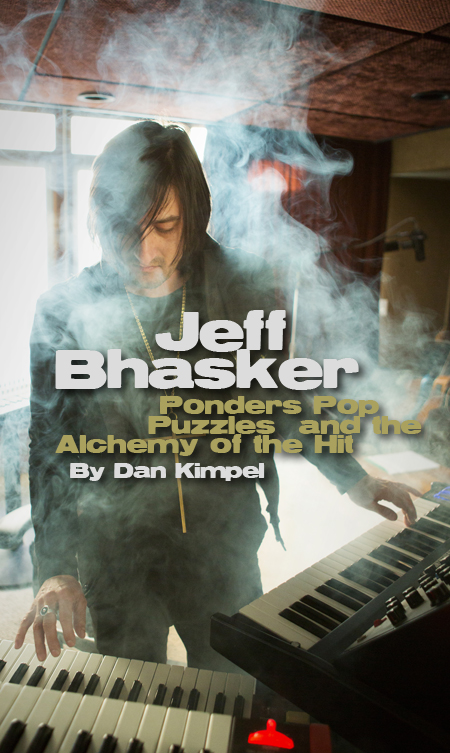
Across a dazzling span of marquee artists––a roster highlighted by Alicia Keys, Kanye West, P!nk, fun., Eminem, Drake, Beyonce, Jay-Z, OneRepublic, Snoop Dogg, Mary J Blige, Bruno Mars, the Rolling Stones, Lana Del Rey and Taylor Swift––Jeff Bhasker has emerged as a wellspring of extraordinary pop prowess.
This accomplished vocalist and musician excels as a gifted songwriter, an inventive arranger and the producer of monumental pop records like “We Are Young” by fun. featuring Janelle Monáe, for which he was awarded a 2013 Grammy Award for Song of the Year. This year his Song of the Year nomination is for “Just Give Me a Reason,” (P!nk featuring Nate Ruess).
Originally from New Mexico, Bhasker studied at Berklee College of Music in Boston, moved to New York City on 9/11 and came to Los Angeles a few years later. Playing keyboards in Kanye West’s band led to his role as West’s musical director and ultimately to the discovery of his own sound.
In this exclusive interview, Bhasker talks to MC about artist development, how his diverse skill set led him to the A-list writing and production gigs, and his belief that he is only as good as his last song.
Music Connection: We heard the just-released single “Down This Road” by Cam, a new country artist who you have signed, developed and produced. We understand that the artist development role is an important endeavor for you?
Jeff Bhasker: I’ve been developing artists my whole career. It happens a lot when you’re producing especially, unless you get lucky and find the ones who know exactly what they’re doing, like Nate (Ruess from fun.) or Kanye (West). After a while you’re like ‘”Wait––why am I developing this artist for someone else’s label. I should be doing it for my label if I’m spending all this time.”
MC: Back in the day, the labels would do it. Would you say that now it seems to be everyone else’s gig.
Bhasker: Sometimes development feels like such a lost practice. Nowadays it’s “Find someone and start recording.” But artists need time to develop. There are a lot of lost albums. Bruno Mars was signed to Motown and they mutually dropped each other. It wasn’t working. Ne-Yo was trying to be an artist, quit, then started writing songs, became a hit songwriter and then became an artist again. You need chances to develop, maybe miss the mark, and then fix it. And to get a little bit jaded almost in a good way––only do something that you like because in the beginning you’re trying to figure out how to please people. Sometimes you develop them and the label doesn’t want to go in your direction. So thank you for wasting all of that time and energy.
MC: So here is the big question: How do you choose your projects?
Bhasker: I alluded to this earlier––I try to work with the people who have the strongest sense of what they want to do, and a clear idea. As a producer that’s one thing that makes my job easier so we don’t waste a lot of time. It relates to your artist development question. Particularly with fun. and Kanye West, they know exactly what they want to do. Then the task is to bring the vision to life. More and more it’s going to take a miracle for me to work with someone who doesn’t know for sure what they want to do.
MC: Is it similar criteria in every type of collaboration?
Bhasker: In writing or producing, the other thing is finding people who have different strengths from your own. I work with Emile Haynie a lot and we have a very similar perspective on what we want the music to sound like, but we have very complementary skill sets. I play keyboards and I know music and arranging, and he’s more self-taught and has these amazing samples and he approaches it from the drums. We can both do the other thing too, but our specialties are very complementary.
MC: In modern pop music, we often see multiple songwriters and producers collaborating on tracks. Is this so everyone can play to his or her strengths?
Bhasker: From my experience on the inside, making an album or writing a song is very much like a puzzle, and there is always a right solution––or maybe the most brilliantly wrong solution. Sometimes there is one line that’s not good enough and someone comes up with the perfect line. So if someone just writes one line, they are a writer on the song because the song wouldn’t be the same without that one line. They might even change one word, or say, “The melody should go like this.” It depends on getting the right people around.
I’ve been doing the New York Times crossword puzzle every day. We’re working on Mark Ronson’s album and Mark’s really good with the puzzle. Someone in the studio might have one answer, and that leads to the next one. Songs should have solutions, and it should all relate. It’s solving that puzzle.
MC: You have had great success in your work with female artists.
Bhasker: It’s true. I think one reason is my singing voice. I use the falsetto a lot. I remember being a kid and my sister would say, “Sing like Whitney Houston.” I would get the intonation right and be in that range. Maybe there’s something there that can translate to female artists. It’s interesting, I’m not sure why that is, but I love the sound of the female voice.
MC: You dropped a mixtape, Born On The Fourth of July, under your artist name Billy Kraven. It shows your singing voice is very expressive; do you use it as an instrument when writing songs?
Bhasker: Singing is what led me to songwriting. D’Angelo was a big hero of mine. His vocals were very layered and musical and coming from a jazz background, I loved that. It’s more part-oriented.














